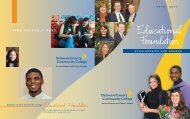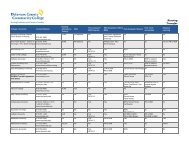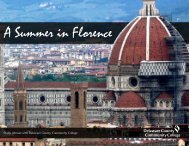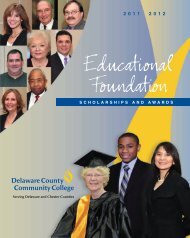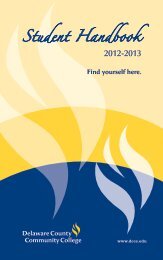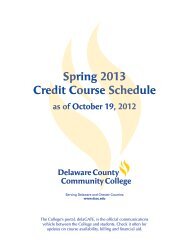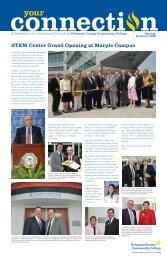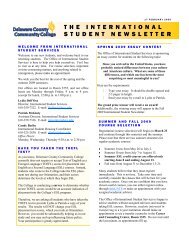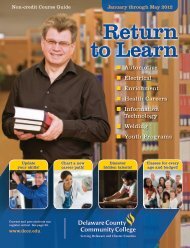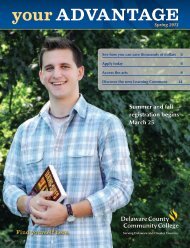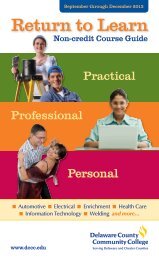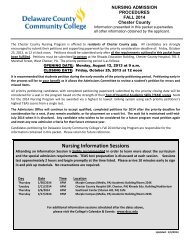2010 Catalog - Delaware County Community College
2010 Catalog - Delaware County Community College
2010 Catalog - Delaware County Community College
Create successful ePaper yourself
Turn your PDF publications into a flip-book with our unique Google optimized e-Paper software.
COURSE DESCRIPTIONS 113<br />
Upon successful completion of this course, students<br />
should be able to:<br />
• Discuss the roles of women reflected in selected literature.<br />
• Construct a series of response essays that demonstrate a<br />
critical analysis of the literature under discussion.<br />
• Demonstrate research and documentation skills through<br />
the exploration of a selected topic.<br />
• Explain the roles of women in literature in terms of<br />
economic, political and social issues.<br />
• Identify literary contributions by women of color who<br />
traditionally have had no "voice," such as African<br />
American, Asian American, Chicano and Native<br />
American writers.<br />
• Analyze the literary elements of the works studied.<br />
Prereq. ENG 100<br />
3 Credits 3 Weekly Lecture Hours<br />
ENG 215<br />
Mystery Literature<br />
This course includes conventional detective stories and<br />
novels, short stories, films and plays not often analyzed as<br />
mysteries. An introduction to logic will be presented, and<br />
writers' use of induction and deduction will be studied.<br />
Later forms of detection such as the "hard-boiled" and<br />
psychological schools will be placed into the chronology of<br />
the genre. The major focus, however, will be on literary<br />
elements of each story: each will be evaluated as to narrative<br />
stance and structure, methods of characterization,<br />
theme and literary devices.<br />
Through reading and analyzing the function of mystery,<br />
students should be able to:<br />
• Recognize the logical processes of each work.<br />
• Discuss literary elements such as characterization, theme,<br />
narrative stance and symbolism.<br />
• Learn to distinguish essential from non-essential facts<br />
in a narrative.<br />
• Write documented papers demonstrating an ability to<br />
reach logical conclusions based on given facts.<br />
• Analyze recurrent themes in this fiction, such as "poetic<br />
justice," criminal motivation and the notion of order<br />
in society.<br />
Prereq. ENG 112<br />
3 Credits 3 Weekly Lecture Hours<br />
ENG 216<br />
Science Fiction Literature<br />
Metaphorically, this course is a journey into the strange<br />
and at times terrifying possibilities of societies in which<br />
technology is out of control. In a sense all of the readings<br />
are works of future shock-speculative fiction in which we<br />
see technological advancement leading to newer problems,<br />
especially of an ethical nature.<br />
Upon successful completion of this course, students<br />
should be able to:<br />
• Comment knowledgeably about the literary and popular<br />
culture contexts of the readings.<br />
• Identify and comment on the typical devices of dystopian<br />
writers (particularly satire, burlesque, caricature and farce).<br />
• Relate these devices to such dystopian themes as<br />
conformity vs. individualism, humanistic vs.<br />
technological goals.<br />
• Recognize and comment critically on the political,<br />
utilitarian and totalitarian abuses of language in<br />
dystopian societies.<br />
• Apply research and outlining skills in a project to be<br />
presented orally.<br />
Prereq. ENG 100<br />
3 Credits 3 Weekly Lecture Hours<br />
ENG 220 British Literature to 1800<br />
This is a survey of English literature from the beginnings<br />
to the pre-romantics. The emphasis is on the major works<br />
and writers.<br />
Upon successful completion of the course, students should<br />
be able to:<br />
• Identify historical and cultural characteristics of each of<br />
the literary periods.<br />
• Identify literary devices such as image, symbol, irony,<br />
conceits, figurative language.<br />
• Trace some ideas through works of each period; i.e., the<br />
concept of warrior, of women, of faith.<br />
• Analyze literary form such as allegory, sonnet, lyric,<br />
satire, short story.<br />
• Develop a precise thesis about a particular work.<br />
Prereq. ENG 112<br />
3 Credits 3 Weekly Lecture Hours<br />
ENG 221<br />
British Literature to Modern<br />
This is a survey of English literature from the romantics<br />
to the moderns. The emphasis will be on the major works<br />
of major writers.<br />
Upon successful completion of the course, students<br />
should be able to:<br />
• Identify historical and cultural characteristics of each of<br />
the literary periods.<br />
• Identify literary devices such as image, symbol, irony,<br />
conceits, figurative language and stream of consciousness.<br />
• Trace some ideas through works of each period; i.e., the<br />
concept of nature, of imagination and of women.<br />
• Identify the personal myth structure of each of the<br />
major writers.<br />
• Analyze literary forms such as allegory, sonnet, lyric,<br />
satire and short story.<br />
• Develop and present a precise thesis about a<br />
particular work.<br />
Prereq. ENG 112<br />
3 Credits 3 Weekly Lecture Hours<br />
ENG 222<br />
Introduction to Shakespeare<br />
This course is a study of representative Shakespearean<br />
plays set against the literary, political and social setting<br />
that spawned them. Attention is paid to Shakespeare's<br />
influence not only in the development of the drama, but<br />
also in the literary tradition of the English-speaking world.<br />
Upon successful completion of this course, students<br />
should be able to:<br />
• Identify selected plays as to type: comedy, history<br />
and tragedy.<br />
• Reconstruct the written word and see each play as a<br />
dramatic production.<br />
• Reconstruct the whole of the play: setting, atmosphere,<br />
action and character.<br />
• Read and comprehend blank verse, specific Elizabethan<br />
idiom and allusions employed by Shakespeare.<br />
• Analyze critically each play for its relationship between<br />
plot and philosophical or thematic base.<br />
Prereq. ENG 112<br />
3 Credits 3 Weekly Lecture Hours<br />
ENG 225 Modern Chinese Literature<br />
Special Studies<br />
This course will involve the study of representative<br />
Chinese literary works written from 1949 (the establishment<br />
of the People’s Republic of China) to the present.<br />
Special attention will be given to the historical context of<br />
the literature in an effort to understand the interplay of<br />
politics, society, and literature in China.<br />
Upon successful completion of this course students<br />
should be able to:<br />
• Identify major characteristics of modern Chinese literature<br />
• Discuss the political influences on/of modern Chinese<br />
literature<br />
• Recognize major writers of modern Chinese literature<br />
• Analyze the influence of Western literary traditions on<br />
modern Chinese literature<br />
• Respond to the literature studied both orally and in<br />
documented essays<br />
• Recognize the contributions of modern Chinese literature<br />
to the world.<br />
3 Credits 3 Weekly Lecture Hours<br />
ENG 230 American Literature -<br />
Shaping the Ideal<br />
A survey of American literature from its colonial beginnings<br />
to 1865, with the emphasis on the study of major figures.<br />
Upon successful completion of this course, students<br />
should be able to:<br />
• Identify various characteristics of periods in American<br />
literature from colonial times to the Civil War.<br />
• Identify various kinds of American literature.<br />
• Indicate his/her interpretation of a poem or a passage<br />
from a poem in American literature of the period.<br />
• Discuss some basic issues treated in the American essay,<br />
short story and novel.<br />
Prereq. ENG 112<br />
3 Credits 3 Weekly Lecture Hours<br />
ENG 231 American Literature -<br />
Romanticism to Skepticism<br />
This course, a continuation of American Literature:<br />
Shaping the Ideal, considers literature from 1865 to<br />
the postwar period.<br />
Upon successful completion of this course, students<br />
should be able to:<br />
• Identify various characteristics of post-Civil War<br />
American literature.<br />
• Identify various socio-economic, historic and aesthetic<br />
influences on the authors and the writing of the period.<br />
• Analyze a work in relation to those forces as well as offer<br />
an independent analysis of them.<br />
• Discuss their intellectual or emotional response to a work<br />
of the period.<br />
Prereq. ENG 112<br />
3 Credits 3 Weekly Lecture Hours<br />
ENG 240<br />
World Literature I<br />
The selective study of great representative literary works<br />
of the world from antiquity to modern times with emphasis<br />
on their social, cultural and intellectual backgrounds.<br />
Special attention is given to the literature of continental<br />
Europe, Asia and Africa.<br />
Upon successful completion of this course, students<br />
should be able to:<br />
• Identify the major historical characteristics of the three<br />
periods covered (ancient world, the medieval period and<br />
the Renaissance).<br />
• List literary form and content that lets us differentiate<br />
among the three periods.<br />
• Discuss (both orally and in writing) examples of literature<br />
in each period.<br />
• Discuss the influence of early periods on later ones.<br />
• Compare and contrast the characteristics of the three periods.<br />
Prereq. ENG 112<br />
3 Credits 3 Weekly Lecture Hours<br />
ENG 241<br />
World Literature II<br />
Continues the balanced, selective study of great representative<br />
literary works of the world from the Renaissance to<br />
the present day in their geographical, historical, economic,<br />
political and sociological contexts. The "emerging"<br />
literatures-works by women, colonials, post-colonials and<br />
those groups generally denied a voice-are studied in an<br />
attempt to enlarge the canon and render it inclusive.<br />
Upon successful completion of this course, students<br />
should be able to:<br />
• Identify the major writers and literary influences of the<br />
cultures studied.



